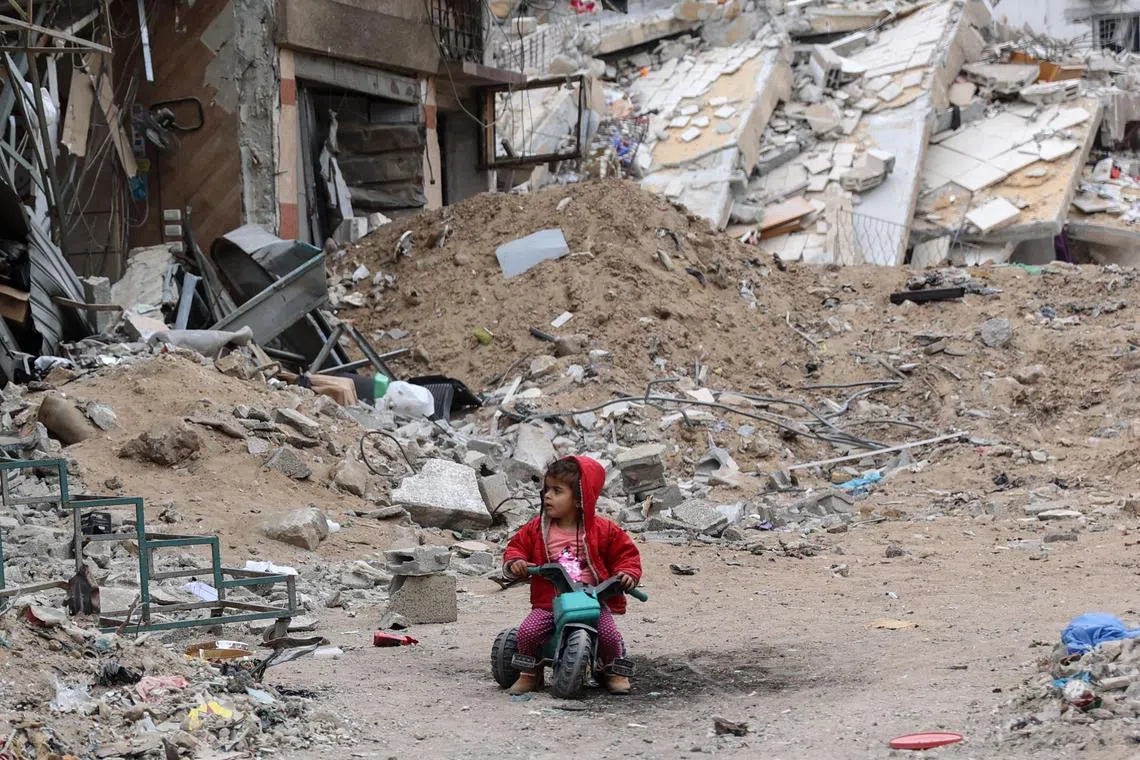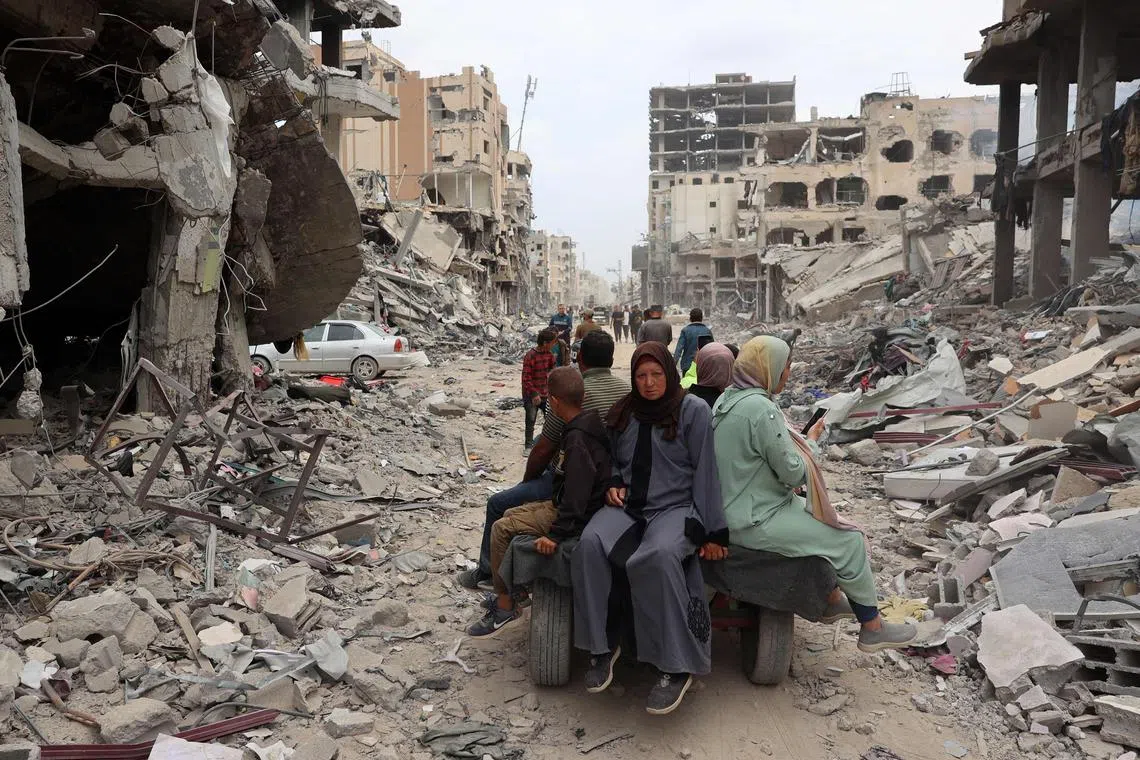Gaza war rages as Hamas studies truce proposal
Sign up now: Get ST's newsletters delivered to your inbox

Under the plan, fighting would stop for six weeks, 40 women and child hostages would be exchanged for hundreds of Palestinian prisoners, and up to 500 aid trucks would enter Gaza per day.
PHOTO: AFP
GAZA STRIP, Palestinian Territories – Israel bombed targets in Gaza on April 9 after Prime Minister Benjamin Netanyahu insisted the army will destroy Hamas despite ongoing Cairo talks towards a ceasefire and hostage deal.
More than six months into the war, Hamas said it was studying a new proposal for a temporary truce, submitted during the talks with US, Qatari and Egyptian mediators.
Under the plan, fighting would stop for six weeks, 40 women and child hostages would be exchanged for hundreds of Palestinian prisoners, and up to 500 aid trucks would enter Gaza per day, a Hamas source said.
Hamas said it appreciates the mediators’ latest efforts, but accused Israel of failing to respond to its longstanding demands, including a full withdrawal of forces from Gaza.
Mr Netanyahu stressed – despite growing pressure from its top ally, the US – that Israel would pursue the twin goals of bringing home the hostages and destroying Hamas after its Oct 7 attack.
“Today I received a detailed report on the talks in Cairo,” the premier said in a video message on April 8. “We are working all the time to achieve our goals, primarily the release of all our hostages and achieving a complete victory over Hamas.”
He said Israeli forces would storm Gaza’s far-southern city of Rafah
The Israeli Premier said: “This victory requires entry into Rafah and the elimination of the terrorist battalions there.
“It will happen – there is a date,” he vowed, without saying when he plans to send troops
US officials renewed their objections to a Rafah operation
“We have made clear to Israel that we think a full-scale military invasion of Rafah would have an enormously harmful effect on those civilians, and that it would ultimately hurt Israel’s security,” said State Department spokesman Matthew Miller.
Israel has invited tenders for 40,000 large tents, according to a document on the Defence Ministry website – part of its preparations to evacuate Rafah ahead of an offensive, a government source told AFP on condition of anonymity.
‘Every home destroyed’
The carnage left by the bloodiest Gaza war was on display in the southern city of Khan Younis, a wasteland of shattered buildings and mountains of rubble after months of heavy bombardment and street fighting.
Displaced Palestinians returned on foot, in cars and on donkey-drawn carts, after Israeli forces pulled out on April 7

Palestinians on a donkey-drawn cart in Khan Yunis on April 8,.
PHOTO: AFP
As Palestinians readied for April 10’s Eid al-Fitr holiday marking the end of the fasting month of Ramadan, they were stunned at the apocalyptic sight of hundreds of gutted or collapsed buildings, bomb craters and tank tracks in the sand.
“I came to see my home, only to find it destroyed and reduced to a pile of rubble,” said Mr Umm Ahmad al-Fagawi. “I am shocked by what I saw. Every home is destroyed, not only mine, but also all the neighbours’ homes.”
Another returnee said she had come back to find “a ruined place – no water, no electricity, no columns, no walls and no doors, there’s nothing. Gaza is not Gaza any more”.
The war broke out with Hamas’ Oct 7 attack against Israel, which resulted in the deaths of 1,170 people, mostly civilians, according to Israeli figures.
Palestinian militants also took more than 250 hostages, 129 of whom remain in Gaza, including 34 who the army says are dead.
Israel’s retaliatory offensive has killed at least 33,360 people in Gaza, mostly women and children, according to the Hamas-run territory’s Health Ministry.
Air strikes, sniper fire
The army said on April 9 that it had destroyed “terrorist infrastructure” throughout Gaza and an “aircraft eliminated a terrorist in Khan Younis who participated in the Oct 7 massacre”.
In the central Gaza Strip, “troops eliminated a number of terrorists in close-quarter combat”, it said. “Several additional terrorists who posed a threat to the troops were eliminated by aircraft strikes and precise sniper fire.”
A UN team on April 8 inspected Al-Shifa hospital, Gaza’s largest, which was mostly destroyed in two weeks of fierce fighting which the army said targeted militants holed up inside.
While the war has destroyed swathes of Gaza, levelling entire city blocks, an Israeli siege has pushed many of its 2.4 million people to the brink of famine.
Israel, under intense US pressure to step up aid deliveries,
Amid the war, violence has flared elsewhere in the Middle East, drawing in Iran-backed groups based in Lebanon, Iraq, Syria and Yemen.
Israel’s army said a projectile targeted its southern port city of Eilat on April 8 but was intercepted by its naval C-Dome missile defence system
Global pressure
Israel has faced a chorus of global calls to halt the fighting and ease the suffering, including from France, Egypt and Jordan.
French Foreign Minister Stephane Sejourne, demanding that vastly more aid be allowed into Gaza, said there are multiple “levers of influence”, including sanctions.
Turkey said it would impose trade restrictions on Israel, covering cement and steel construction materials, sparking an Israeli vow to take retaliatory steps.
Nicaragua has brought Israel’s ally Germany before the International Court of Justice to demand emergency measures to stop Berlin from sending Israel weapons and other assistance.
Lawyers for Nicaragua argued that Germany is in breach of the 1948 United Nations Genocide Convention, set up in the wake of the Holocaust.
Germany’s representative has rejected the claim


